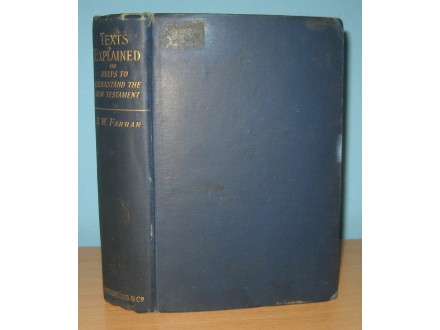TEXT EXPLAINED or helps to understand the New Testament
| Cena: |
| Želi ovaj predmet: | 6 |
| Stanje: | Polovan bez oštećenja |
| Garancija: | Ne |
| Isporuka: | Pošta Post Express Lično preuzimanje |
| Plaćanje: | Tekući račun (pre slanja) Lično |
| Grad: |
Šabac, Šabac |
ISBN: Ostalo
Godina izdanja: 1850 - 1899.
Jezik: Engleski
Kulturno dobro: Predmet koji prodajem nije kulturno dobro ili ovlašćena institucija odbija pravo preče kupovine
Tematika: Religija i duhovnost
Autor: Strani
55405) TEXT EXPLAINED or helps to understand the New Testament , by F.W. Farrar , deacon of Canterbury and deputy clerk of the closet to the Queen ;
Publisher ; Longmans , Green ad CO London
Year : 1899
Farrar, F. W. (Frederic William), 1831-1903
Farrar was born in Bombay, India, and educated at King William`s College on the Isle of Man, King`s College London and Trinity College, Cambridge. At Cambridge he won the Chancellor`s Gold Medal for poetry in 1852. He was for some years a master at Harrow School and, from 1871 to 1876, the headmaster of Marlborough College.
Farrar spent much of his career associated with Westminster Abbey. He was successively a canon there, rector of St Margaret`s (the church next door), archdeacon of the Abbey. He later served as Dean of Canterbury; and chaplain in ordinary, i.e. attached to the Royal Household. He was an eloquent preacher and a voluminous author, his writings including stories of school life, such as Eric, or, Little by Little and St. Winifred`s about life in a boys` boarding school in late Victorian England, and two historical romances.
Farrar was a classics scholar and a comparative philologist, who applied Charles Darwin`s ideas of branching descent to the relationships between languages, engaging in a protracted debate with the anti-Darwinian linguist Max Müller. While Farrar was never convinced by the evidence for evolution in biology, he had no theological objections to the idea and urged that it be considered on purely scientific grounds. On Darwin`s nomination, Farrar was elected to the Royal Society in 1866 for his philological work. When Darwin died in 1882, Farrar helped get the church`s permission for him to be buried in Westminster Abbey and preached the sermon at his funeral.
Farrar`s religious writings included Life of Christ (1874), which had great popularity, and Life of St. Paul (1879). He also contributed two volumes to the commentary series The Cambridge Bible for Schools and Colleges, on the Gospel according to St. Luke, and on the Epistle to the Hebrews. His works were translated into many languages, especially Life of Christ.
Farrar believed that some could be saved after death.He originated the term `abominable fancy` for the longstanding Christian idea that the eternal punishment of the damned would entertain the saved.[9] Farrar published Eternal Hope in 1878 and Mercy and Judgment in 1881, both of which defend his position on hell at length.
Farrar was accused of universalism, but he denies this belief with great certainty. In 1877 Farrar in an introduction to five sermons he wrote, in the preface he attacks the idea that he holds to universalism. He also dismisses any accusation from those who would say otherwise. He says, `I dare not lay down any dogma of Universalism, partly because it is impossible for us to estimate the hardening effect obstinate persistence in evil, and the power of the human will to resist the love of God.`
In April 1882, he was one of ten pallbearers at the funeral of Charles Darwin in Westminster Abbey; the others were: The Duke of Devonshire, The Duke of Argyll, The Earl of Derby, Mr. J. Russell Lowell, Mr. W. Spottiswoode, Sir Joseph Hooker, Mr. A. R. Wallace, Professor Huxley, and Sir John Lubbock.
Hard cover, size 14 x 19,5 cm , XXV + 356 pages
CENOVNIK POŠTE SRBIJE od 6.septembra 2024. ZA PREPORUČENE TISKOVINE: :
od 101 g do 250 g 190din
od 251 g do 500 g 212 din
od 501 g do 1.000 g 225 din
od 1.001 g do 2.000 g 264 din
Predmet: 69638409









